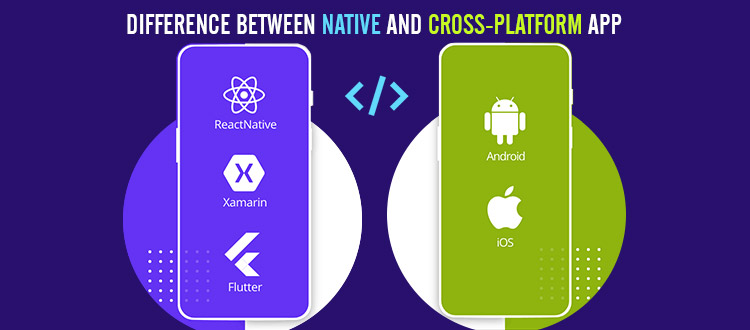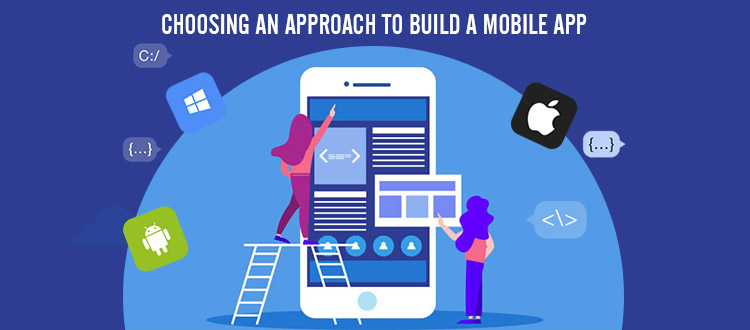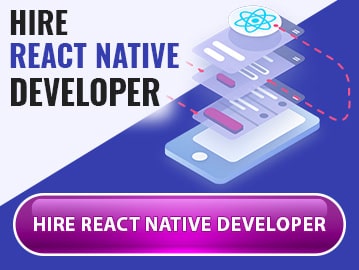Native Vs. Cross-Platform Development: Pros and Cons
Written by Hemendra Singh on November 24, 2020 | Updated on: November 24, 2020

Native vs. Cross-Platform is a very popular debate. This debate has been responsible for dividing the tech community for years. Some parties have claimed that they have got the answer but both the technologies are in a constant state of evolution. And this is the reason that people revisit this topic to find out which of these options is currently in the lead.
Both platforms have their pros and cons. These factors can impact everyone related to the app including the developers, owners, and app users. As per the statistics, there are more than 4.5 million apps available on both Google Play Store and Apple App Store targeting more than 15 billion mobile phones across the globe.
One of the most important decisions to launch an app is choosing between native and cross-platform mobile app development. Why it is a very important decision because it involves a long term implication in terms of time, cost, and functionality. This article will try to explore both the options and weigh the pros and cons of each.
Table of Contents
The Significance of Mobile Application Platform
There are two most popular mobile platforms around the world – iOS and Android. Globally Android has more market share than iOS. But in the US, iOS has a bigger market share of 56 percent compared to Android which has a market share of 43.5 percent.
Hence you need to choose your app platform wisely. Choosing the platform carelessly may put you in trouble and you might lose an important target region. For that, you need to know the region of your audience to build the presence of your app on each of those platforms.
There are two ways by which you can do that.
First, you need to build a native app for each platform and the second is to create a single cross-platform app supported by multiple platforms. Hence this decision will play a critical role in making your app reach its targeted audience.
What is Native App Development?
Native app development implies creating or building a mobile application exclusively for a single platform. A programming language and some tools are used to build such an app for a single platform. For example, a native Android app can be built with Java or Kotlin and for iOS apps, you can choose Swift and Objective-C.
If you want to have an exceptional user experience, you must go for Native apps as they are generally high performance. There you get an enhanced user experience as the visuals are fully compatible with the UX platform. Although, new enterprises are concerned as the cost of native app development is high in order to integrate the app on both the platforms.
Pros of Native App Development
Broad Functionality
The platform you are working on will provide you the access to every API and tool needed. In short, technically there are no limits on how the developers could work with the new application.
High-End Scalability
Apps built specifically for the native environment are more likely to be more scalable. This is possible because of the flexibility in resource management and the availability of the array of tools.
Optimum Store Support
The publication of a native app is generally easier and it can rank higher on the app store of the platform as it better in terms of performance and speed.
Great UX and High Performance
The code and the underlying resources tend to interact directly and it results in high performance. Also as far as the user experience is concerned, they have a better UX that goes hand in hand with the platform.
Cons of Native App Development
High Cost
It can be quite a costly affair if you want to build a native app for both the platforms – Android and iOS. This implies the deployment of two individual teams on different platforms which ultimately adds up to the overall cost of the project. Know how to hire a react native app developer in your budget.
Time Consuming Affair
As the work done for a platform, cannot be replicated for another, hence native app development is quite time-consuming. Further, for native app development, a separate team is needed to work on the other version.
In a nutshell, we can say that the major pros of Native app development are broad functionality, high-end scalability, Great UX and High Performance, and Optimum Store Support whereas the cons of Native app development are namely High cost and Increased time to complete the project.
What is Cross-Platform App Development?
Cross-Platform app development is a process that focuses on creating an app that works on multiple platforms. This is achieved by making use of tools such as React Native, Flutter, and Xamarin, where the apps built can be deployed on both the platforms – Android and iOS. Check here the complete guide on cross-platform app development.
Cross-platform development can save you your time and cost but you might compromise over the process quality. It is difficult to make a tailor-made app that runs on both the platforms optimally and the app will be needing an additional abstraction layer when running which ultimately results in lowering the performance.
Generally, startups go with this option as they favor the reduction in cost and time with cross-platform app development. However, one thing should be taken into account that customization of the app could be a challenging task beyond what’s permitted in the framework.
Also Read: Ask Me anything About React Native, Flutter, Ionic App Development
Pros of Cross-platform App Development
Cost-Effective
Unlike in Native where you would be requiring two teams for development, here at cross-platform app development you will only one to create a cross-platform application. Hence, you would be saving a huge chunk of money on the overall development cost.
Faster Development Process
On Cross-platform you can create an app by writing a single code base for both platforms. In simple words, a single cycle of development is sufficient for creating such an app that runs on multiple platforms.
Single Code Base
Till now we must have clearly understood that the app here is created with a single cross-platform development tool and hence only one code base is created for both the platforms.
Cons of Cross-platform App Development
Slower Performance
The rendering processes and the need for an additional abstraction layer are responsible for making the cross-platform app slower than its native counterpart.
Limited Functionality
It might be difficult for the developers to access smartphone functionalities such as geolocation, microphone, and camera in ways possible for a native app.
Limited UX
Cross-platform apps are not able to take advantage of native UX components. Hence, it is not able to deliver a similar UX experience that is accustomed to the concerned platform.
In a nutshell, we can say that the pros of Cross-Platform app development are namely cost-efficient, faster development process, and single code base, whereas the cons are namely slower performance, limited functionality, and limited UX.
The Basic Difference Between Native and Cross-platform App
By now we have clearly understood both the concepts, so now let us try to know the basic difference between both the platforms. When we talk about native apps, they are built exclusively for a specific platform. For example, Google prefers Java for Android, whereas Apple favors Objective C and Swift for iOS. Developers can make use of these acceptable languages and can make better use of the innate features of these platforms. A native app developed on iOS will not work on Android and vice versa.
Cross-platform applications are compatible with multiple platforms. As the market share of Android and iOS is maximum, most cross-platform applications are designed to run on these two platforms only. The development of these apps is majorly in HTML and CSS since these web technologies are standard and platform-independent. In the market, there are several development tools related to cross-platform application development that allow developers in creating these applications with little trouble.
Points Need to be Taken into Consideration While Choosing an Approach to Build a Mobile App
Cost
Apps that are built by native development are generally high-performance apps, but they are costly to build. If you have a limited budget, then cross-platform app development is the ideal choice for you. You can save up to 40% or more as an app is created by using only a single code base that works on both the operating systems – Android and iOS.
Application Complexity
If you want to build an app that just fetches information from the network and display it, then you can go for cross-platform app development. However, you should go with Native Development if your app involves heavy processing and requires access to low-level APIs like Bluetooth.
Time For Development
In some projects, the user wants to get an MVP as soon as possible. In such a scenario, you can consider cross-platform app development. There is no need to work on two versions of the app. Instead, you only need a single cycle of development for an application to be released for iOS and Android.
Also Read: 6 Trends You May Have Missed About Cross-platform Frameworks In 2020
UX/UI
Native Development is generally known if you are looking for stunning visuals and experience. While developing in a Native environment, developers have access to the components of UI and UX. Cross-platform app development on the other hand will greatly limit the UX/UI element of the app.
What to choose – Native or Cross-Platform?
The decision to choose between the two is very critical as it will immensely affect your time, cost, and the way users will respond to your application. You should consider the above discussion before finalizing your choice. Still, if you are in a confusion, have a look at these additional tips to clear your doubts and confusions:
Why Choose Native App Development?
You should choose Native App development if:
- Your app demands complete access to all of the device resources and services.
- You want your application to be highly responsive.
- You want optimum utilization of your mobile phone’s hardware.
- You want your app that can be easily enhanced and updated with new features and functionalities in the future.
Why choose Cross-Platform App Development?
You should choose Cross-platform App development if:
- You are completely okay if your app is less responsive
- The application is not enriched with high-end animation nor deal with complicated logic.
- The window is short to test an idea and hypothesis in the app market.
Final Words
In the end, we can conclude by saying that both Native and Cross-Platform Development have their pros and cons. In the end, the choice depends on the requirements of the project and the skills of the developers involved.
Native apps are still the favorite in terms of user experience and performance. They might be costlier, but you will get superior quality with fewer defects and better visuals. While on the other hand, Cross-platform apps are easy and quick to build. However, you have to settle down in terms of user experience on the respective platform.
If you still facing doubt in choosing the platform then you can contact us and get a free consultation from our experts at PuzzleInnovationz. We can guide you in the best possible manner.
My name is Hemendra Singh. I am Managing Director and co-founder of PuzzleInnovationz, a Mobile App Development Company. I am having a keen interest in the latest trends and technologies that are emerging in different domains. Being an entrepreneur in the field of IT sector, it becomes my responsibility to aid my audience with the knowledge of latest trends in the market.


![Oracle Database Advantages, Disadvantages and Features [Guide 2021]](../wp-content/uploads/2019/08/Oracle-Database-Advantages-Disadvantages-150x150.jpg)











